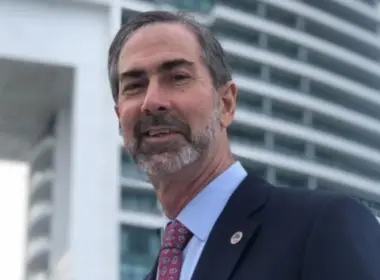How Miami has become the new global city
By JP Faber
On a rainy evening in early November, a sell-out crowd of more than 250 people crowded a second-floor auditorium in the downtown campus of Miami-Dade College. Students, professors, government officials, entrepreneurs, business executives – all were gathered at the event hosted by the Economic Club of Miami to listen to a conversation between Miami Mayor Francis Suarez and Ken Griffin, the billionaire hedge fund manager who made headlines announcing he would move his entire firm from Chicago to Miami.

Among his first questions, Suarez asked Griffin why he decided to relocate. Griffin related an incident which took place during the pandemic, when his firm set up a net- work of several thousand computer servers in the ballroom of the Four Seasons Hotel in Palm Beach. “We turned it into a trading floor big enough to run the entire U.S. equity market – in five days,” said Griffin. “This told us a lot about what could be possible in Florida. It would take us months to do this in a northern city… In Chicago, it took us five years just to build a bike overpass.”
Suarez said he was intrigued that Griffin’s response focused on the role of government. “We in Miami believe that government should facilitate,” he said, “not that government should dictate.” Suarez went on to describe his formula as mayor of Miami: “We want to keep taxes low, we want to keep people safe, and we want to lean into innovation. That is our strategy.”
Whether that mantra is the key to Miami’s recent flood of corporate and capital relocations, unprecedented in its history, is up for debate. Suarez may either be the city’s most dynamic mayor in recent memory, or the luckiest municipal leader in the country – or both – but the results are beyond question. Under his tenure, hundreds of billions of dollars in managed assets have relocated to the city, along with dozens of major corporations bringing tens of thousands of high-paying jobs. In the last 24 months, a litany of prestigious firms have either moved to Miami or announced plans to do so. Among them are names like Blackstone, Microsoft, Goldman Sachs, CI Financial, Blockchain.com, Siebert Finan- cial Corp., Ichan Enterprises, and Softbank, along with scores of smaller high-tech and global trading companies. All told, they have already added 15,000 high-paying jobs to the city’s private payrolls and are expected to add thousands more.
The reasons for this influx are numerous. Some are recent, like the sudden surge of New Yorkers (followed by Californians, Texans, and Chicagoans) who fled COVID, looking not only for the state’s earlier break from the pandemic shutdown, but also for the mayor’s triumvirate of lower taxes, a safer place to live, and a government that encourages the development of new busi- ness. But many of the seeds are deeper.
“It’s a combination of good policies that have been applied over [decades],” says Alex Horenstein, a professor of economics at the University of Miami. “These are not things that happen all at once. They evolve over time, and then you break some surface and change happens faster.” Miami, says Horenstein, “has transformed itself into a business city, becoming very cosmopolitan – and with a falling crime rate. It’s not something that happened just last year.” The city is also enjoying what can only be described as a virtuous cycle, where advances pile onto each other. “Once you attract money and offer better services, you attract more wealthy people from all over the world,” says Horenstein. Leading the corporate charge have been a slew of relocations by CEOs, from Keith Rabois of Founders Fund, Shutterstock founder Jon Oringer, and Shervin Pishevar of Hyperloop One, to Harry Hurst of Pipe, Alex Taub of Upstream, and venture capitalist David Blumberg of Blumberg Capital. A roster of intellectual capital has moved to the Miami area as well.
Today, Lendai employs 40 people worldwide, with 10 in Miami – and growing, says Benyamini. “Ten years ago, you had to go to New York or Silicon Valley to find good tech talent,” says Benyamini. “Now, the talent comes to you if you’re in Florida. It’s a great place to open an office.”

Underlying the latest investment wave is Miami’s long history as the de facto capital of Latin America, reflected not only in its 60 percent Latin population (many first-generation ex-pats from every nation in Latin America) but also by its trade prowess. Miami International Airport is now the leading airport in the country for both global air cargo and international passenger traffic, just as PortMiami has long been the leading entry point of goods to and from South and Central America. In its October inaugural “Investing in America” report, the Financial Times and Nikkei rated Miami as the top U.S. city for foreign business investment.
Miami’s strategic geographic location, along with its multicultural and multi-lingual community, continues to be a major draw. For example, Dr. Raju Rama, the CEO of India-based health-tech company CallHealth HoldCo., plans to establish U.S. headquarters in Miami for many of the traditional arguments. “The reason why we are choosing Miami is that it is strategically better than New York or California for reaching the markets of North America and South America,” says Rama. “The investment cost is still far less than Chicago or New York, and there’s access to far more diversity in terms of people and skill sets.” CallHealth is the world’s first fully integrated digital platform providing access to everything about health. The company currently operates out of Hyderabad, India, and plans to enter the U.S. market in 2023.

30 Companies Moved/Moving to Miami (2020-2023)
Icahn Enterprises 2020
Softbank 2020
Nucleus Research 2020
Palm Drive Capital 2020
Founders Fund 2020
Elliott Management Corp 2020
Blackstone Group Inc. 2021
Payless Shoes 2021
Major Food Group 2021
R&B Realty Group 2021
Starwood Property/Starwood Capital 2021
Quinn Emanuel Urquhart & Sullivan 2021
FundKite 2022
Belong 2022
King & Spalding 2022
El Al Israel Airlines Ltd. 2022
Windstar Cruises 2022
Blockchain.com 2022
Siebert Financial Corp. 2022
Goldman Sachs 2023
SH Hotels & Resorts 2023
AerCap 2023
Citadel 2023
Kirkland & Ellis 2023
Winston & Strawn 2023
Thoma Bravo 2023
Microsoft Corp 2023
CI Financial 2023
A-CAP 2023
PricewaterhouseCoopers 2023
While Miami’s geographic advantage as the trading hub for the Americas precedes the current influx of dollars and companies, that role is now expanding. “During my tenure as the Director of PortMiami, I traveled the world to meet with business executives and government officials in order to expand the port’s business,” says Bill Johnson, the current chairman of the World Strategic Forum, which just held its annual meeting at the Biltmore Hotel in Coral Gables. “As we worked tirelessly to sell Miami as a business destination, my colleagues and I would frequently refer to Miami as “the gateway to the Americas.” While that title is still accurate, it’s clear Miami has grown to become the hemisphere’s gateway to the world. In 2022, Miami is staking its claim as a global community.”
THE SUAREZ FACTOR
Suarez himself has been instrumental as a catalyst of this transformation. His relentless pushing of Miami as a hub for high tech and fintech – including as the U.S. center for cryptocurrencies – has seen him selling the idea in opening remarks at events ranging from the eMerge Americas technology conference on Miami Beach in April, to Johnson’s World Strategic Forum at the start of November. “There is an attitude in Miami that has created an emergence,” he told the audience at the eMerge conference. To the Strategic Forum gathering, he cited “the transition of the world from an industrial economy of goods and services to an economy of digital assets.”
Suarez likes to recall his now famous 2020 tweet in response to the question, “What if you move Silicon Valley to Miami?” His reply was “How can I help?” – which he calls “a huge counter narrative to what was happening in American cities.” At the time, New York City had rejected Amazon’s plan to set up a headquarters there, and a city official in San Francisco had said “F*** Elon Musk,” which prompted the mogul to relocate to Texas. “So that was the context of the tweet,” says Suarez, “which was viewed by the tech community as the first mayor in America that gets it and understands that American prosperity is what’s going to propel successful cities into the future.”
He has also personally sold the idea of moving to Miami. At the Economic Club forum, Griffin noted how Suarez, as soon as he heard that Citadel was considering relocating, went to Chicago himself to present him options.
Among the attendees listening to Griffin at the forum was Ian Weisberger, the co-founder of CoinRoutes, a crypto trading platform that relocated from New York last year after Weisberger heard Suarez talking at a networking cocktail event on Miami Beach. “His whole attitude, about wanting to help businesses that move here, really appealed to me,” says Weisberger, who also hired staff from a city-sponsored Venture Miami job fair; his firm currently employs 32 in Miami.
“The ‘How Can I Help’ Suarez campaign has been the leading face of this movement, and as a community we have benefited from that effort,” says James Kohnstamm, executive vice president at the Beacon Council, the county’s economic development agency. Regardless of the cause, the pace of capital and corporations pouring into Miami in the last two years is nothing less than astonishing. Kohnstamm points not only to the influx of money and companies, but to the growing quality of the work force. “On the talent recruitment side, for much of 2021 Miami led the nation for talent migration, the most popular of any U.S. metro area,” he says. “The main place they were coming from is New York, then California, [but] we’ve kind of hit a tipping point where we are now a global talent destination.”
One consequence of the new, smart labor pool, says Kohnstamm, is a burst in venture capital financing of novel ideas. VC raised for fintech companies in Greater Miami rose from $120 million in 2020 to $2.28 billion in 2021; VC for health-tech companies rose from $376 million in 2020 to just over $1 billion in 2021. “Just in the month of September, it was reported that South Florida pulled in a half billion [in VC investments] in one month,” says Kohnstamm.
Still, the biggest of all the moves was that by Citadel, with its $50 billion in assets. An initial relocation of several hundred staffers in early 2023 is expected to blossom into 1,000 employees. Griffin’s firm will initially move to the 830 Brickell Building, the city’s newest office tower. There Citadel will join other tenants that include Microsoft, New York-based insurance firm A-CAP, private equity firm Thoma Bravo, and AerCap, among others. CI Financial, Canada’s largest wealth management firm ($245 billion in assets), will occupy 20,000-square-feet in the building when it opens in January; Chicago law firm Winston & Strawn LLP will occupy 35,000-square-feet in the 55-story tower.

Tallest 20 Towers Under Construction in Miami 2022
THE WALDORF ASTORIA MIAMI (100 STORIES, 1,040 FEET)
OKAN TOWER (70 STORIES, 902 FEET)
BACCARAT RESIDENCES (75 STORIES, 828 FEET)
ASTON MARTIN RESIDENCES (66 STORIES, 818 FEET)
ONE SOUTHSIDE PARK (62 STORIES, 754 FEET)
830 BRICKELL (50 STORIES, 734 FEET)
E11EVEN HOTEL & RESIDENCES (65 STORIES, 698 FEET)
E11EVEN RESIDENCES BEYOND (65 STORIES, 698 FEET)
LEGACY MIAMI WORLDCENTER (55 STORIES, 691 FEET)
MISSONI BAIA (57 STORIES, 649 FEET ABOVE SEA LEVEL)
MIAMI RIVER (54 STORIES, 640 FEET)
ARIA RESERVE TWIN TOWERS (60 STORIES, 637 FEET)
UNA RESIDENCES (46 STORIES, 613 FEET)
NATIIVO (51 STORIES, 588 FEET)
MIAMI WORLD TOWER (53 STORIES, 579 FEET)
THE ELSER (49 STORIES, 573 FEET)
DOWNTOWN 1ST (58 STORIES, 557 FEET)
CANOPY CLUB (44 STORIES, 546 FEET)
ST. REGIS RESIDENCES MIAMI (TWIN TOWERS 48 AND 47 STORIES)
MIAMI WORLDCENTER (55 STORIES)
The 830 Brickell building is just one of the new buildings transforming the Miami skyline. To house both companies and their growing workforce, no fewer than two dozen high rises are underway, filling the sky with cranes. Among them: the $400 million mixed-use Okan tower, the $426 million Waldorf Astoria hotel/condo skyscraper, and the One Brickell City Centre office tower, with 1.6 million-square-feet of space. Both latter projects will be coming in at more than 1,000 feet tall, creating the impression of a Miami mo43 similar in appearance to Hong Kong than a typical Southern U.S. city. Of the top ten tallest buildings either completed or under construction, all are at 700 feet or taller, with much of the funding coming from foreign capital – Okan by Turkish investors, for example, and One Brickell City Centre by Hong Kong-based Swire properties in partnership with New York-based Related.
“Many financial giants have moved their headquarters to Miami,” says Mayor Suarez. “We’ve estimated roughly $2.5 trillion dollars’ worth of assets under management have moved to Miami in the last 24 months alone. If you don’t think that statistic isn’t getting attention around the world, I can tell you it is.
“What’s happening now is you are seeing a metamorphosis of Miami from the capital of the Americas to one of the most globally significant cities in the world. We are in the center of five meta markets – New York, Silicon Valley, South America, the Middle East, and Europe – where we have direct flights to all. So, we have the ability to be a central force in a decentralized world. Being a center for the aggregation capital and the deployment of capital is going to make us a very prominent city. I call it the Capital of Capital.”
As Kohnstamm puts it, “We’re experiencing what I’ve been calling dynamic demand. There is such an interest in our market, not only from businesses but from talent and investment and just for the destination of Miami. People want to be part of what we are and where we are going.”












